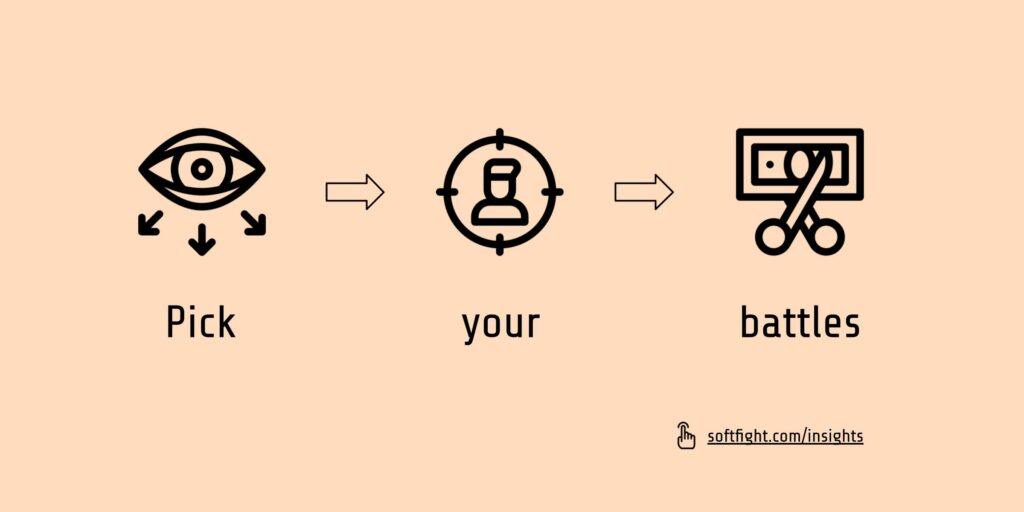One of the participants to our February webinar told me this is their biggest pricing challenge:
“unscrupulous competitors who deliberately lower prices and lure customers to themselves, and then leave them with a bad experience and an unfinished product.”
I see at least three different threads in this story. The moral dimension, the threat to competitive balances in the industry and the search for a solution.
Losing the battle
First, the moral underpinning. The use of very precise and vivid vocabulary (“unscrupulous”, “lure”, “bad experience”) reflects outrage at what looks like immoral behaviour from certain software vendors that are putting a bad name on all other companies in the industry.
I’ve been there too in the past. There were many similar instances when I felt a similar outrage, but one particular project is fresh in my memory, even though it happened almost 10 years ago.
We were bidding on a big project and clearly had the better solution. We offered higher quality by a long shot and had a more cost-effective offer over the long-term for the client. And still, the buying committee chose a lower-cost competitor, offering a much less sophisticated solution.
I was so enraged that I wrote a long email to the CEO of the potential customer, with whom I had no prior interaction, laying out all the facts of the process, all the numbers and the business case. I was convinced that if he knew what his subordinates were doing he would surely reverse their decision and we would win the project.
That didn’t happen and we lost the bid.
Years later I learned that the implementation went badly wrong. The company lost a few years and all the money spent with that cheaper supplier.
I now see these types of situations in a more nuanced way.
You are operating in an industry with tens of thousands of suppliers offering software development services in a global market. The law of big numbers teaches us that, statistically, there are bound to be quite a few bad apples in the industry.
The barriers to entry have been getting lower and lower. Which means that your standards of quality are not going to be followed or even comprehended by many people that have the same title as you have (co-founder, sales manager of a software company).
For many buyers, it’s really difficult to tell the difference. Very few of them buy software services often. Many of them only look for a new supplier every 3, 5 or even 10 years. They are not professionals from this perspective.
Which means that the moral aspect is almost irrelevant and it doesn’t help you to lose sleep over this. You can safely assume that for every project that you are bidding, there will be at least one unscrupulous competitor.
The challenge
Secondly, the panic.
That’s the feeling experienced by many entrepreneurs who have spent years building a team doing quality work, with skilled people capable of tackling difficult technical challenges.
They panic when they hear from a potential customer
“I got an offer from another supplier at half price from what you are asking for. I would really love to work with you guys, I am convinced you would do a great job on my project, but there is no chance I can convince my VP that we should pay double the market rate”.
It’s the sort of “deer in the headlights” type of moment for many. It feels like there is not much they can do, but lower their prices as much and as fast as possible.
A few days later, rage replaced panic. Rage directed at all these immoral people who trick customers with their low prices, only to overcharge them when the project goes over the estimated timeline and delivering much lower quality than promised.
If the client expects to pay 16 USD per hour and your prices are several orders of magnitude higher, you are right to feel that lower cost suppliers are spoiling the market.
I wouldn’t worry if I were you.
Anyone looking for a software development team can go on the internet and find suppliers at all possible prices. From under 15$/hour up to 400$/hour or more, with a fairly normal distribution between these extremes.
If low cost suppliers could bring about the collapse of the industry, this would have happened already in the 1980s. It’s 40 years later and the software services sector is getting bigger and bigger every year.
You can ignore low cost competitors without worrying about any impending doom.
Winning the war
This brings us to the third aspect, finding a solution.
Ignoring something from moral and mental attention perspectives doesn’t mean inaction. On the contrary.
There are lots of actions you can take to fight against this threat, because not all buyers fall into these traps set by lower cost competitors.
If you lose many projects because clients go with lower cost suppliers, the problem might be in your strategy: you are finding or attracting the wrong kind of prospects.
You could try to see where you can find and what you can do to attract customers who are looking for a higher quality and are willing to pay a higher price.

If you constantly get feedback from clients that you are too expensive, maybe you really are too expensive. But instead of immediately lowering your prices, take a moment to analyse and understand where you are.
Maybe there are some actions you can take to increase the quality you deliver, to bring it closer on par with the prices you are asking for.
Or maybe the quality is right, the price is right, but the value is not understood by the potential customers because you are not making enough effort to communicate it properly and effectively.
Don’t forget, perceived quality is objective quality.
It’s unfair, it’s annoying, but this is how the real world works and there is nothing you or I can do to change this anytime soon. You might as well embrace it and make the most of it.
WHAT THIS MEANS FOR YOU
It’s just business.
You can be as moral and ethical as you want to be. But this will not be enough to win projects, because not everyone is like you.
Be proactive.
It’s important that you find ways to counterbalance any unethical behaviour of your competitors.
You can do this with a disciplined sales process, using third-party reports, stories and examples to influence what your buyers see and hear before making a decision.
Qualify.
Try to find as many clients as possible who are not easily fooled by lower prices.
Design a sales process that allows your team to easily and quickly weed out the prospects that could be a waste of time.
Put a structure and discipline in place to influence to your advantage the prospects that have the capacity to pay higher prices and can buy from you.

